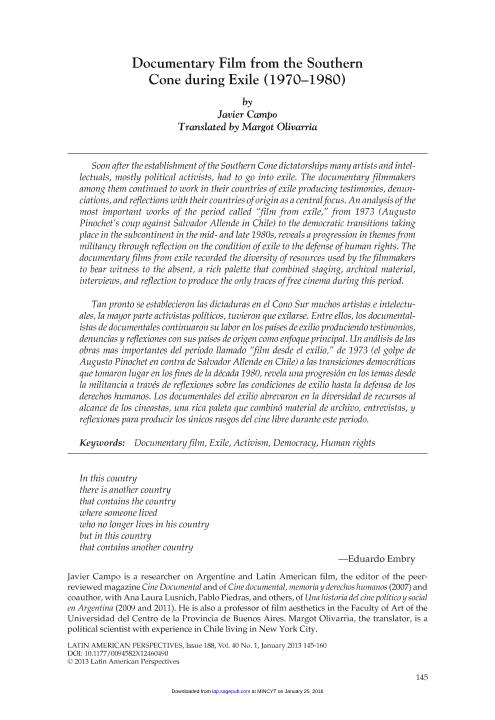Mostrar el registro sencillo del ítem
dc.contributor.author
Campo, Javier Alberto

dc.date.available
2016-01-25T20:23:11Z
dc.date.issued
2012-09-26
dc.identifier.citation
Campo, Javier Alberto; Documentary Film from the Southern Cone during Exile (1970-1980); Sage Publications; Latin American Perspectives; 40; 1; 26-9-2012; 145-160
dc.identifier.issn
0094-582X
dc.identifier.uri
http://hdl.handle.net/11336/3783
dc.description.abstract
Tan pronto se establecieron las dictaduras en el Cono Sur muchos artistas e intelectuales, la mayor parte activistas políticos, tuvieron que exilarse. Entre ellos, los documentalistas de documentales continuaron su labor en los países de exilio produciendo testimonios, denuncias y reflexiones con sus países de origen como enfoque principal. Un análisis de las obras mas importantes del período llamado “film desde el exilio,” de 1973 (el golpe de Augusto Pinochet en contra de Salvador Allende en Chile) a las transiciones democráticas que tomaron lugar en los fines de la década 1980, revela una progresión en los temas desde la militancia a través de reflexiones sobre las condiciones de exilio hasta la defensa de los derechos humanos. Los documentales del exilio abrevaron en la diversidad de recursos al alcance de los cineastas, una rica paleta que combinó material de archivo, entrevistas, y reflexiones para producir los únicos rasgos del cine libre durante este periodo
dc.description.abstract
Soon after the establishment of the Southern Cone dictatorships many artists and intellectuals, mostly political activists, had to go into exile. The documentary filmmakers among them continued to work in their countries of exile producing testimonies, denunciations, and reflections with their countries of origin as a central focus. An analysis of the most important works of the period called film from exile, from 1973 (Augusto Pinochet´s coup against Salvador Allende in Chile) to the democratic transitions taking place in the subcontinent in the mid and late 1980s, reveals a progression in themes from militancy through reflection on the condition of exile to the defense of human rights. The documentary films from exile recorded the diversity of resources used by the filmmakers to bear witness to the absent, a rich palette that combined staging, archival material, interviews, and reflection to produce the only traces of free cinema during this period.
dc.format
application/pdf
dc.language.iso
eng
dc.publisher
Sage Publications

dc.rights
info:eu-repo/semantics/openAccess
dc.rights.uri
https://creativecommons.org/licenses/by-nc-sa/2.5/ar/
dc.subject
Documentary Film
dc.subject
Exile
dc.subject
Human Rights
dc.subject
Activism
dc.subject
Democracy
dc.subject.classification
Estudios sobre Cine, Radio y Televisión

dc.subject.classification
Arte

dc.subject.classification
HUMANIDADES

dc.title
Documentary Film from the Southern Cone during Exile (1970-1980)
dc.type
info:eu-repo/semantics/article
dc.type
info:ar-repo/semantics/artículo
dc.type
info:eu-repo/semantics/publishedVersion
dc.date.updated
2016-03-30 10:35:44.97925-03
dc.journal.volume
40
dc.journal.number
1
dc.journal.pagination
145-160
dc.journal.pais
Estados Unidos

dc.journal.ciudad
Los Angeles
dc.description.fil
Fil: Campo, Javier Alberto. Universidad de Buenos Aires. Facultad de Ciencias Sociales. Instituto de Investigaciones "Gino Germani"; Argentina. Consejo Nacional de Investigaciones Científicas y Técnicas; Argentina
dc.journal.title
Latin American Perspectives

dc.relation.alternativeid
info:eu-repo/semantics/altIdentifier/url/http://lap.sagepub.com/content/40/1/145.abstract
dc.relation.alternativeid
info:eu-repo/semantics/altIdentifier/issn/0094-582X
Archivos asociados
